MAMA Youth Project blasts out of pandemic stronger than ever
Yet industry must do more to support the charity
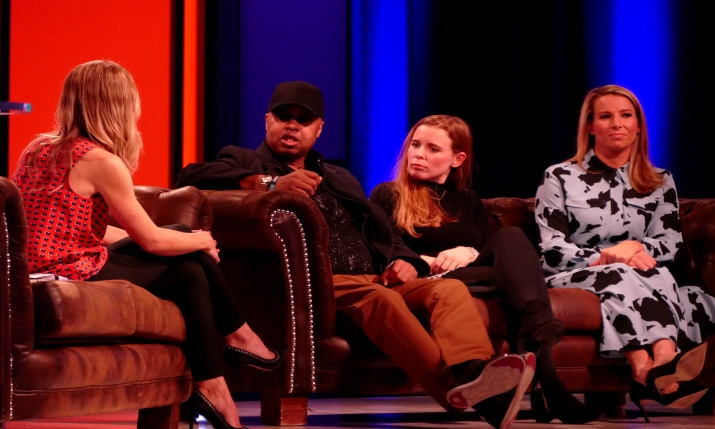
On the Abi Stephen’s Show panel at the SVG Europe Women Winter Networking Event in January 2020, panelists including Bob Clarke, MAMA Youth Project, discuss role models and how to bring more women and BAME people into this industry
MAMA Youth has made it through the pandemic with aplomb despite massive challenges early on. It is now stronger than before thanks to a huge push to diversify its resources and therefore save both itself and its alumni from falling into “a deep hole”.
However, MAMA Youth Project chief executive Bob Clarke says that the broadcasting industry must do more to support the only charity it has that produces a diverse pool of trained talent ready for employment.
The last 12 months has seen the charity make huge advances to diversify its revenue streams and partnerships, following Clarke and his team’s heroic efforts. He notes: “The fact that we’re still here means that we’ve been successful in doing that.”
“This is a great free service do for the industry. We’re quite unique in what we do; we’re providing talent. We don’t do it in a segregated way because it’s not just about black people; we’re about full inclusion. We can give consultancy. We can do all that [and provide] real, authentic, tangible help, but you gotta pay for it”
On the production side, Licklemor Production, the MAMA Youth fully-owned production company, started to develop and produce more commercial content in 2020, creating employment and career development opportunities for alumni.
Licklemor co-produced a short series with CPL, a four episode-long spoken word show for Sky Arts called Life&Rhymes presented by well-known British dub poet and author, Benjamin Zepheniah. The show was also nominated for a BAFTA.
As well as other partners, Netflix came on board with the project in January this year, donating a sum of money to directly support 10 young people to get through the MAMA Youth training scheme, as well as supporting the core team during the pandemic, and its alumni.
The funding enabled the project to hire an executive PA for two years to help Clarke and Ciobanu to cope with the pressures they faced to keep the charity running during the pandemic, and a Netflix talent pool membership also running for two years has opened up opportunities for MAMA Youth alumni to work on Netflix productions.
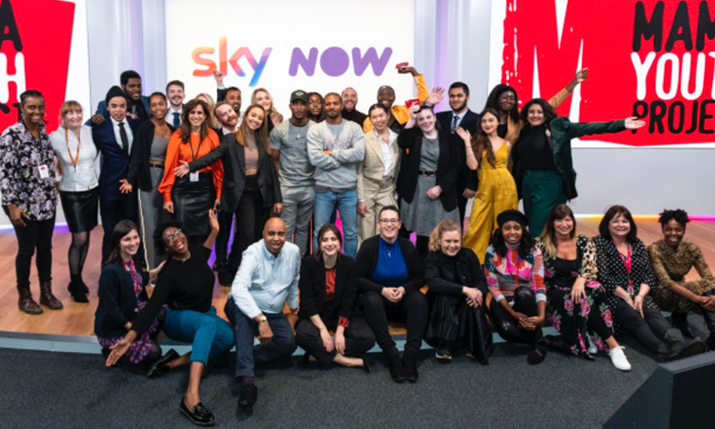
MAMA Youth Project Season 17 graduates celebrate at Sky Sports in 2019
Financial rock and a hard place
Yet despite these successes which have resulted in the charity coming out of 2020 in a far better position than when it began, the year was not an easy one.
When lockdown began last year Clarke and his team were midway negotiating with the renewal of training contracts with its two biggest supporters, Sky and the BBC. Clarke noted: “We’ve been in talks with the BBC since 2019 about continuing our core training. The 2020 cohort was an extension to our initial agreement to allow time for new procurement requirements to be put in place.
“They have been clear that the current training model which won the Princess Royal Training Award for developing talent is not something they would like to continue with. We are still waiting on procurement, but the new BBC focus is in the regions, and that includes training as well.
“We already knew that the BBC wasn’t going to work with us the way they worked with us before, but we were [already working with] the last BBC cohort [of MAMA Youth trainees], which we had to delay [because of the lockdown].”
“They will just fall into a deep hole and then all that work to get them to where they are now, and the way they see it, a future, would disappear, because they’ve fallen down that deep hole. It would be game over”
MAMA Youth needs to run two training courses for two groups of cohorts per year in order for it to survive financially. However, with the BBC-sponsored course start delayed, the charity it found itself facing a worrying period.
“So [we thought], “how do we survive and what money do we have to survive on while we’re not doing that training?”. We took advantage of the furlough scheme for the first three months, but then myself and one colleague had to come off [furlough] because we had to work, just really trying to see if we could get money to make sure that the charity survived, because we’re not getting money if we’re not doing training,” says Clarke.
Sky made a donation early on in the pandemic to help the charity make up for the financial loss of its partnership with the BBC, which enabled the charity to consolidate and concentrate on the diversification of its revenues.
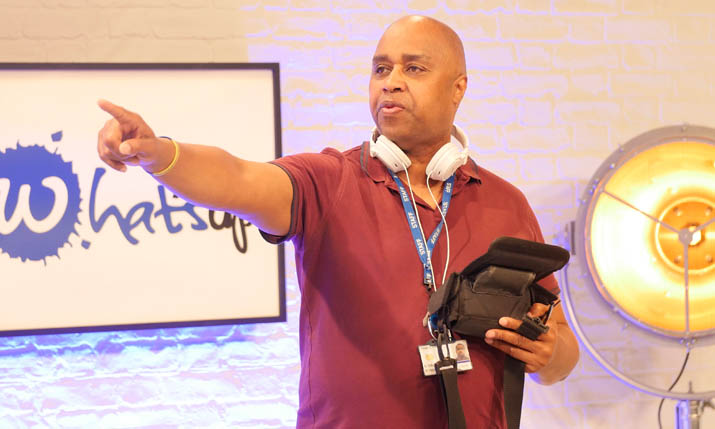
Bob Clarke, MAMA Youth Project founder and chief executive, spoke about diversity in sports broadcasting – and the general lack of it – at the SVG Europe Sport Production Summit 2019
Keeping out of a deep hole
Once it was clear the charity’s staff were safe thanks to the furlough scheme, the next question was to consider its alumni. Clarke states: “Our alumni, especially those that are within their first three years of working in the industry, [were a concern for us]. They’ve all coming from challenging backgrounds, now working in TV, but their life challenges continue. The family problems still continue, the neighbourhood space problems continue. It doesn’t disappear.
“We knew that if these guys in these first three years of working in our industry, if they fall off the ladder, they’ll be the first to hit hard ground. They will just fall into a deep hole and then all that work to get them to where they are now, and the way they see it, a future, would disappear because they’ve fallen down that deep hole. It would be game over.”
The first three years for a member of the MAMA Youth Project’s alumni out in the job market, like all young people starting out in a career in media, is the hardest. Explains Clarke: “It’s the tricky part because they’re establishing themselves, establishing their reputation. But they’re also still facing the life challenges that may be there, to do with family, to do with life in their neighbourhoods; things that may have happened to them that required them to have counselling. That’s still there. So we started a Hardship Fund so that we could support any of our alumni that came forward.”
Boosting trainee mental health
A further issue faced by MAMA Youth was that its next cohort intake was poised and ready to begin their training, but two days prior to the course beginning, lockdown began. “Some had already moved [to London] for the course. We had to think about them and also some of them with their mental health; how long would this lockdown last for? When I asked them to just let us know how they coping, it was just so sad, it just makes me wanna cry. Then we thought, right. Okay. Let’s also start to raise some money for them as the main concern was really their environment, their circumstances, and their mental health.”
“We can’t take our eye off the ball for one second because we are walking that tightrope to the other side and we’re not struggling with our balance – we’re balancing ourselves quite well as we go across – but one mistake and we fall off. We’re very aware of that. Very aware of that”
To improve the mental health of the trainees waiting to begin the BBC-funded course, which would also see 15 of them go onto paid placements at the BBC after training completion, Clarke decided to set a date for the course to start, no matter what. “I had to say to them, what we’re going to do on the 20 July, we’re going to start now. We hope to start where you can physically go to Sky and do things, but if not, we’re going to start anyway. It will just be online. This is how we’re going to do it and this is how it’s going to work so that you will end up becoming alumni. You’re still have that opportunity because at the end of the day, that’s the goal; to become a MAMA Youth Project alumni. Once you become alumni you get that support into employment.”
The trainees began their course in July 2020 and were able to go to MAMA Youth’s base at Sky to carry out their entire training in person, under COVID guidelines. The only difference to the production of the What’s Up programme for Sky, which the trainees create as part of their course, was that due to the pandemic protocols required, four episodes instead of seven were produced over the 10 weeks of production.
When that first cohort finished, the second cohort for Sky had to begin immediately with just a week between groups. This was hard on Clarke and his staff who normally have a break to recuperate from the intensive training and selection process, yet they pushed ahead with the second group, also pushing the project’s team to almost breaking point in the process.
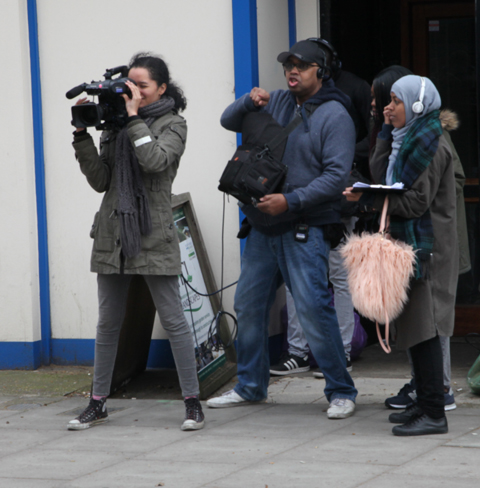
Taking filming to the streets with MAMA Youth Project
Tangible outcomes mean employment
Since the beginning of the MAMA Youth Project, tangible outcomes for its trainees have meant employment. However, over the years the project has seen some of its talent leave the industry, which MAMA Youth’s lack of resources and staff could not prevent. As the project’s director of operations, Cristina Ciobanu, says: “One month of unemployment and some [trainees] are at risk of becoming vulnerable again, struggling with homelessness, mental health, and other issues they were struggling with when they started our training.”
The project developed ‘talent pool’, designed to provide a direct link between graduates and industry. Industry partners contribute financially to develop the talent pool and are kept up to date with the struggles faced by new entrants from under-represented backgrounds, and give back through mentoring, guru sessions and masterclasses.
“There are areas where we need to strengthen our support for alumni,” continues Ciobanu. “It is obvious that the pastoral support we offer trainees during the training needs to extend long term for alumni. Young people struggling with a disability or those in need of counselling cannot start and develop their careers successfully without the right support put in place for them. If young people have completed our boot camp training successfully, they can thrive in any company. We are making progress with our inclusion awareness workshops to help partners understand the value of an inclusive team, but we have a long way to go until production teams are ready to open the door for disabled talent.”
Find out more about and give your support to MAMA Youth Project here
Thanks to a successful and continuously growing year for its partnerships, talent pool, inclusion awareness workshops and work with the charity sector, the project is now looking at expanding its staff numbers to increase core support, as well as more people to work on its growing talent pool team side as demand for its services have grown and will continue to grow.
Yet Clarke notes: “We can’t take our eye off the ball for one second because we are walking that tightrope to the other side and we’re not struggling with our balance – we’re balancing ourselves quite well as we go across – but one mistake and we fall off. We’re very aware of that. Very aware of that.”
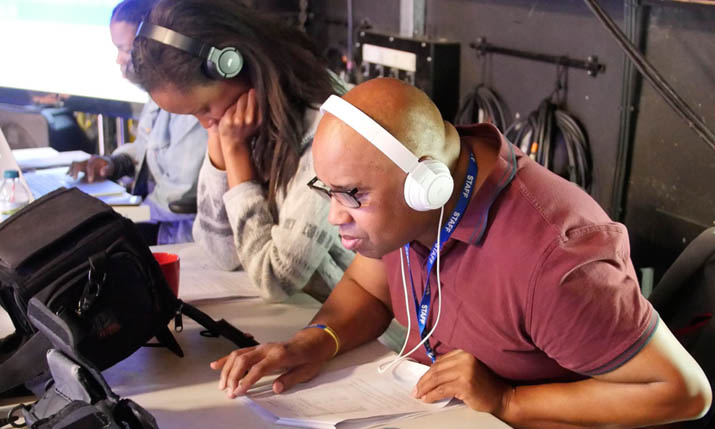
Help MAMA Youth Project push to help more young people, and therefore the sports broadcasting industry, succeed
Running up hill
Despite these successes, Clarke still needs more support from the industry which he feels is often taking MAMA Youth Project for granted. He explains: “The frustration still is you’re making us work so hard to achieve this story when you could give so much more. The broadcast industry and media in general keep telling us we’re the best at what we do and our achievements and what we’re doing. Stop telling us that if you’re not prepared to actually really support us, and support us financially.
“Stop seeing us as a charity for the industry in the sense of, “oh, you’ll do this for us, we don’t know where you get your money from and how you do it, but this is a great free service that you provide”. This is a great free service do for the industry. We’re quite unique in what we do; we’re providing talent. We don’t do it in a segregated way because it’s not just about black people; we’re about full inclusion. We can give consultancy. We can do all that [and provide] real, authentic, tangible help, but you gotta pay for it. You’ve just gotta pay for it.
“Use us!” continues Clarke. “We want to grow. We want to help more. We want to help you more. As a boss of a company how frustrating must it be that they’ve been talking about inclusion, put [a scheme to improve it internally] into place, and years later there’s the same problems [even though they’ve] put this into place; 10 years down the line, and they’re still coming to me saying, “we’ve still got all the inclusion problems, and the broadcasters are telling us we’ve got to [improve on] this”. We can help you put things into place that actually will help solve it better for you; that the thesis you put in place doesn’t just patronise people but is actually authentic and does what you wanted it to do. It doesn’t have to be complicated, but you need someone that understands these things to put things in place.”
On getting that financial support from companies that want the trained graduates of MAMA Youth Project but are not yet contributing, Clarke says: “That’s the frustrating side. They’re making it such hard work; more hard work than it needs to be. If you’re running up that hill, and running and running, and you see one of those walking conveyor things and you think, “oh, I could get on that! it could be a lot easier!”, but they’re still making me run up the hills.”

